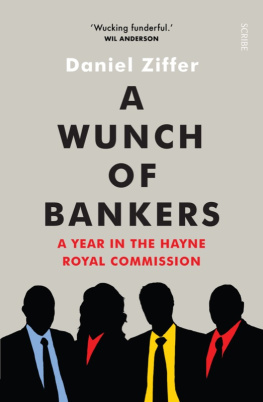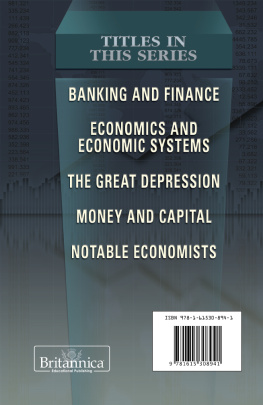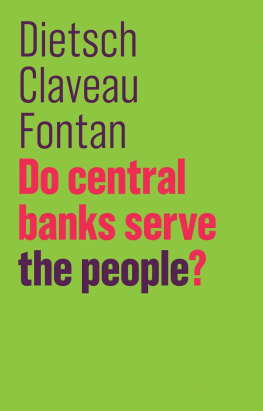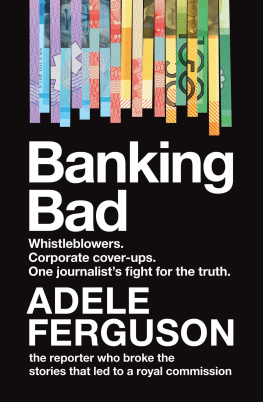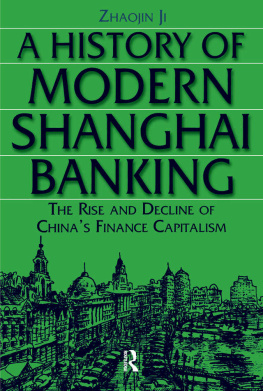THE
PEOPLE
VS
THE
BANKS
Our financial services industry is a crime scene and Michael Roddan is the forensic pathologist. He has written a compelling account of what happenedit is a page-turner in the great tradition of true crime, but also a cautionary account of how a service industry forgot how to serve.
ALAN KOHLER
THE
PEOPLE
VS
THE
BANKS
MICHAEL RODDAN

MELBOURNE UNIVERSITY PRESS
An imprint of Melbourne University Publishing Limited
Level 1, 715 Swanston Street, Carlton, Victoria 3053, Australia
www.mup.com.au

First published 2019
Text Michael Roddan, 2019
Design and typography Melbourne University Publishing Limited, 2019
This book is copyright. Apart from any use permitted under the Copyright Act 1968 and subsequent amendments, no part may be reproduced, stored in a retrieval system or transmitted by any means or process whatsoever without the prior written permission of the publishers.
Every attempt has been made to locate the copyright holders for material quoted in this book. Any person or organisation that may have been overlooked or misattributed may contact the publisher.
Cover design by Peter Long
Typeset in 11/16pt Sabon by Cannon Typesetting
Printed in Australia by McPhersons Printing Group

9780522875188 (paperback)
9780522875195 (ebook)
For my mum, Sue.
Thanks for teaching me, and so many others, to read.
I should have stayed with Teachers Credit Union.
CONTENTS
ABBREVIATIONS
| ABA | Australian Banking Association |
| ACBF | Aboriginal Community Benefit Fund |
| ACCC | Australian Competition & Consumer Commission |
| ACTU | Australian Council of Trade Unions |
| AEC | Australian Electoral Commission |
| APRA | Australian Prudential Regulation Authority |
| ASFA | Association of Superannuation Funds of Australia |
| ASIC | Australian Securities & Investments Commission |
| ASX | Australian Securities Exchange |
| AUSTRAC | Australian Transaction Reports and Analysis Centre |
| BBSW rate | bank bill swap rate |
| CBA | Commonwealth Bank of Australia |
| CDPP | Commonwealth Director of Public Prosecutions |
| CFMEU | Construction, Forestry, Maritime, Mining and Energy Union |
| CFR | Council of Financial Regulators |
| FOFA | Future of Financial Advice |
| FOS | Financial Ombudsman Service |
| FPA | Financial Planning Association |
| FSC | Financial Services Council |
| FSU | Finance Sector Union |
| GFC | global financial crisis |
| ICAC | Independent Commission Against Corruption |
| ICAN | Indigenous Consumer Assistance Network |
| ISA | Industry Super Australia |
| NAB | National Australia Bank |
| PC | Productivity Commission |
| RBA | Reserve Bank of Australia |
| SMSF | self-managed super fund |
| UAP | United Australia Party |
BARBARIANS AT THE GATE
Things have changed, Scott Morrison told the guardians of the financial system.
It was Wednesday night, 29 November 2017, and Wayne Byres, the head of Australias banking regulator, APRA, and Philip Lowe, the Reserve Bank governor, were hooked up on a call to Morrison, urging the treasurer to take control of the situation at the eleventh hour. It would be the least worst option, they said.
Frustrated by the Coalitions refusal to set up a royal commission into the banks, a cabal of rogue backbenchers led by Nationals MP Barry OSullivan were on the brink of clinching enough votes to launch their own unwieldy financial services inquiry. The proposed commission of inquiry, which would be instilled with all the powers of a royal commission but set up outside of the hands of the government, was finally within reach. Tomorrow, the bill was sure to pass parliament.
It couldnt be allowed to happen, Byres and Lowe warned Morrison. OSullivans commission could do irreparable damage to the financial system. Everybodys job, everybodys mortgage, every loan to every business in the country was dependent on the strength and credibility of the financial system, they said, and OSullivan was about to lift the lid on Pandoras box.
With the help of a few of his Nationals colleagues, Labor, the Greens and a handful of crossbench MPs, OSullivan had just secured the numbers to blow open the casket. On the numbers, Morrison had lost control, and the executives of the major banks were terrified. For two years, they had claimed the sky would fall in should they be subjected to the glare of a royal commission. Recessions, spiralling interest rates and housing market implosions were all forecast by a sector desperate to avoid scrutiny. Now, it was all but certain at the hands of the uncontrollable OSullivan bill.
Lines of urgent communication were opened up between the banking sector and the Reserve Bank of Australia (RBA) and the Australian Prudential Regulation Authority (APRA), the two regulators charged with protecting the stability of the financial system.
For Lowe and Byres, the national economic interest dictated that the government would have to take a different course from the one it had charted. A royal commission was regrettably necessary, the pair told Morrison.
We had to deal with the maths in the Parliament, Morrison later said. And the maths in the parliament was going to lead to an unwieldy and directionless and haphazard commission of inquiry which would have done far greater damageand that was not something that we believed should be allowed to happen. Things had changed.
There are decades where nothing happens. And then there are weeks where decades happen. Over that last week of November, everything happened.
Just seven days earlier, OSullivan had released his private members bill for the commission of inquiry into the banking sector. It had sprung from a seldom-used piece of legislation that allows the parliament to hold the government to account. When the government of the day will not launch a royal commission into a particular case, a separate Act allows the parliament to establish a commission of inquiry that reports to parliament rather than the governor-general. Any such inquiry can be given whatever powers a parliament sees fit to give it, as long as they are constitutional.
Greens senator Peter Whish-Wilson had floated the idea of a financial services commission of inquiry a year before, borrowing from the unusual parliamentary manoeuvre that had been used to investigate High Court justice and former Labor attorney-general Lionel Murphy in the 1980s.
Despite the pace of events in the last week of November, momentum for the commission of inquiry had been building for some time.
In late October, the High Courts decision to disqualify former deputy prime minister Barnaby Joyce on the basis of his dual citizenship had shaved down the governments wafer-thin parliamentary majority. In the aftermath, Queensland independent Bob Katter and Nick Xenophon Team MP Rebekha Sharkie had given support to a push by Queensland Nationals MP George Christensen to trigger a commission into the banks. Christensen had only recently backed down from his threat to cross the floor to support the Greens own bill for a commission of inquiry, which was co-sponsored by the Senate crossbench and passed the upper house.
Next page

